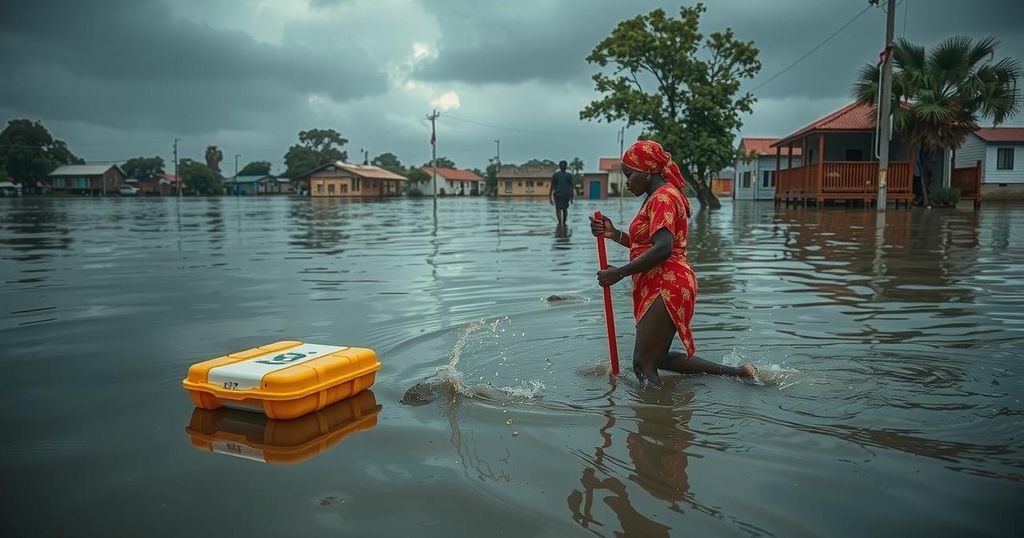IRC Issues Urgent Warning on Cholera Outbreak Amid Severe Flooding in Nigeria and Niger

The IRC has warned of a significant increase in cholera cases in Nigeria and Niger, with Nigeria reporting a 239% rise in cholera deaths in 2024, totaling 359 fatalities. The IRC’s treatment unit in Borno State is overwhelmed, while Niger has recorded 881 cases and 18 deaths due to flooding. Urgent action and additional resources are necessary to address the humanitarian crisis and prevent further disease spread.
The International Rescue Committee (IRC) has issued a grave warning regarding a significant rise in cholera cases following severe flooding in Nigeria and Niger. Reports indicate a staggering 239% increase in cholera deaths in Nigeria, amounting to 359 fatalities, as stated by the Nigerian Public Health Agency. Additionally, the IRC’s cholera treatment unit in Gubio Internally Displaced Persons (IDP) camp in Borno State is currently overwhelmed, reaching full bed capacity. In Niger, the floods have resulted in 881 cholera cases and 18 deaths, severely impacting over 1 million individuals. In light of these circumstances, the IRC is actively responding to the outbreak in Borno State and continuously monitoring the situation in Niger. The organization emphasizes the urgent need for increased resources to enhance their operations and adequately address the humanitarian crisis in flood-affected areas. The IRC is dedicated to combating cholera, which poses a heightened risk in communities lacking access to clean water. The organization is focused on preventing further spread of the disease through its efforts, which include providing shelter, cash assistance, and healthcare services to those affected by the flooding. The catastrophic floods of 2024 have magnified humanitarian needs across West Africa, affecting over 1.4 million people in Niger alone. The IRC has established a cholera treatment unit equipped with 20 beds at the Gubio IDP camp, staffed by trained professionals to provide round-the-clock care. However, with the unit at full capacity, the IRC, as the sole health service provider authorized by the government at this location, is working tirelessly to expand the bed capacity and improve medical resources. Moreover, oral rehydration points have been set up in flood-impacted areas, particularly in IDP camps, to administer swift treatment for acute watery diarrhea and to identify suspected cholera cases through community engagement efforts. The IRC is preparing for a potential escalation of the outbreak by stockpiling essential medical supplies and rehydration fluids. Melody Munz, the IRC Niger Country Director, expressed the gravity of the situation, stating the floods have rendered many individuals vulnerable to easily preventable diseases. Urgent action is necessary to avert further loss of life, with immediate support needed for frontline organizations. Babatunde Ojei, the IRC Nigeria Country Director, stressed the timeliness of collective efforts to control the outbreak and prevent additional fatalities. The IRC is also advocating for a significant shift in climate financing strategies to implement anticipatory actions that mitigate the impact of disasters in flood-prone nations. The organization has already initiated forecasting systems in Kogi and Adamawa States to predict floods, allowing communities to take necessary precautions to protect themselves and their livelihoods. With adequate support and funding, this proactive approach could be expanded to empower affected communities and lessen the repercussions of such devastating events.
The cholera outbreak in Nigeria and Niger has escalated dramatically due to recent severe flooding, which has critically overwhelmed local health systems. Cholera is a waterborne disease that can spread rapidly in environments lacking proper sanitation and clean drinking water. The floods of 2024 have led to increased vulnerability in affected regions, where infrastructure has been damaged, further complicating the humanitarian response. The IRC has positioned itself as a key player in providing assistance and is monitoring the spread of this preventable disease closely.
In summary, the IRC is responding decisively to the cholera outbreak exacerbated by the catastrophic flooding in both Nigeria and Niger. The organization is actively working to expand healthcare facilities and resources while emphasizing the need for immediate support from local and international partners to prevent further loss of life. Furthermore, a proactive approach in anticipating future flooding events is crucial in mitigating the impacts of such disasters, ensuring communities are better prepared in the future.
Original Source: www.rescue.org






